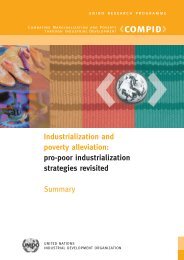Manual on the Development of Cleaner Production Policies ... - Unido
Manual on the Development of Cleaner Production Policies ... - Unido
Manual on the Development of Cleaner Production Policies ... - Unido
You also want an ePaper? Increase the reach of your titles
YUMPU automatically turns print PDFs into web optimized ePapers that Google loves.
DEVELOPMENT OF CP POLICY<br />
MODULE 4: POLICY TOOLS AND INSTRUMENTS<br />
or <strong>the</strong> possible approaches to <strong>the</strong>ir soluti<strong>on</strong>. Informati<strong>on</strong>-based strategies are instruments used to fill in<br />
<strong>the</strong> knowledge gap. Instead <strong>of</strong>—or in additi<strong>on</strong> to—prohibiting or restricting polluting activities, policy<br />
makers may choose to provide <strong>the</strong> public with informati<strong>on</strong> about envir<strong>on</strong>mental risks posed by certain<br />
pollutants, provide [<strong>the</strong> industry] with technical informati<strong>on</strong> <strong>on</strong> preventing polluti<strong>on</strong> and/or to educate<br />
<strong>the</strong> c<strong>on</strong>sumer <strong>on</strong> envir<strong>on</strong>mental hazards or <strong>the</strong> characteristics <strong>of</strong> specific products.<br />
The underlying assumpti<strong>on</strong> behind informati<strong>on</strong>-based policies is that actors may not take <strong>the</strong> optimum<br />
or even correct decisi<strong>on</strong>s, because <strong>the</strong>y simply do not have sufficient informati<strong>on</strong> about available<br />
opti<strong>on</strong>s. Two general directi<strong>on</strong>s can be distinguished as regards promoting CP informati<strong>on</strong>:<br />
1. Technical assistance provided or financed by <strong>the</strong> Government or by CP centres can assist<br />
companies through training, pilot projects for technology transfer, studies <strong>of</strong> life-cycle impacts,<br />
informati<strong>on</strong> disseminati<strong>on</strong>, envir<strong>on</strong>mental audits, assistance in obtaining envir<strong>on</strong>mental<br />
certificati<strong>on</strong>, etc.;<br />
2. Informati<strong>on</strong> policy is proving to be an increasingly important instrument, aimed at <strong>the</strong> general<br />
public. The mandatory release <strong>of</strong> plant-level polluti<strong>on</strong> data can generate market-driven changes<br />
in <strong>the</strong> behaviour <strong>of</strong> polluting firms. Similarly, <strong>the</strong> disseminati<strong>on</strong> <strong>of</strong> informati<strong>on</strong> <strong>on</strong> CP opti<strong>on</strong>s<br />
can build up market pressure <strong>on</strong> polluting companies.<br />
Some specific examples <strong>of</strong> informati<strong>on</strong>-based strategies that may be introduced by government<br />
include:<br />
(a) Promoting <strong>the</strong> adopti<strong>on</strong> <strong>of</strong> targeted, high-pr<strong>of</strong>ile dem<strong>on</strong>strati<strong>on</strong> projects, to illustrate <strong>the</strong><br />
techniques and cost-saving opportunities associated with <strong>Cleaner</strong> Producti<strong>on</strong>;<br />
(b) Requiring public disclosure <strong>of</strong> informati<strong>on</strong> <strong>on</strong> envir<strong>on</strong>mental performance by, for example,<br />
establishing a pollutant release and transfer register, stimulating greater voluntary corporate<br />
reporting, and requiring <strong>the</strong> provisi<strong>on</strong> <strong>of</strong> informati<strong>on</strong> <strong>on</strong> specific materials;<br />
(c) Initiating and/or supporting measures that address c<strong>on</strong>sumpti<strong>on</strong>, such as eco-labelling schemes<br />
and envir<strong>on</strong>mental product declarati<strong>on</strong>s;<br />
(d) Promoting <strong>the</strong> adopti<strong>on</strong> <strong>of</strong> effective training initiatives;<br />
(e) Encouraging educati<strong>on</strong>al instituti<strong>on</strong>s to incorporate preventive envir<strong>on</strong>mental management in<br />
<strong>the</strong>ir curricula, particularly within engineering and business courses;<br />
(f)<br />
Issuing high-pr<strong>of</strong>ile awards for enterprises that have effectively implemented <strong>Cleaner</strong> Producti<strong>on</strong>.<br />
Establishing a nati<strong>on</strong>al CPC programme<br />
Nati<strong>on</strong>al and local governments may establish formal <strong>Cleaner</strong> Producti<strong>on</strong> strategies or programmes in<br />
order to act as a framework for <strong>the</strong> coordinated implementati<strong>on</strong> <strong>of</strong> subsequent, more specific, policy<br />
instruments. While <strong>the</strong> UNIDO/UNEP Nati<strong>on</strong>al <strong>Cleaner</strong> Producti<strong>on</strong> Centre Programme is <strong>on</strong>e <strong>of</strong> <strong>the</strong><br />
best known, <strong>the</strong> nati<strong>on</strong>al CP programme <strong>of</strong> Chile is an interesting example <strong>of</strong> a nati<strong>on</strong>wide effort to<br />
promote CP.<br />
PAGE 104
















